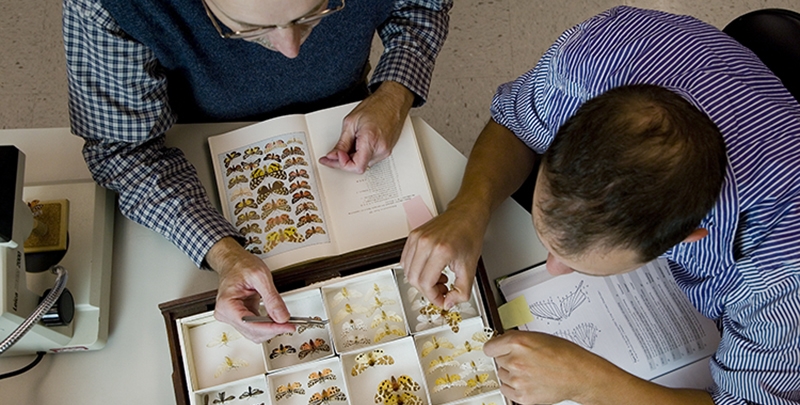Biodiversity is the variety of life on Earth at all levels ranging from genes to species to ecosystems, and it is the foundation for all of the life sciences. There is now a broad scientific consensus that biological diversity is being eroded globally at a rate unprecedented in human history.
We know that increasing loss of biodiversity is altering biosphere-level processes that we depend on for $3-33 trillion of environmental services annually. There is an urgency to conducting biodiversity studies, because burgeoning human populations and associated human activities worldwide are rapidly eliminating natural habitats that sustain biodiversity. The causes of biodiversity loss include human impacts on habitats (habitat destruction, fragmentation, restructuring) and organisms (over-exploitation, introduction of invasive species, predators, parasites). Biodiversity is essential to human well-being - the quality of air, water, and food depends on the renewable cycles and healthy ecosystems that are driven by biodiversity.
Research in the Department of Entomology positively influences understanding and conservation of biodiversity by describing the unique nature of the biota and by collaborating with local academic, government, and conservation entities. The pace of basic biodiversity research must be accelerated, and failure to do so will limit our capability to solve impending scientific and human problems.
Current Objectives, Efforts and Approaches
Our objectives include original research, training of students, and public engagement through citizen science and extension activities. Specifically, we will:
- Enhance our understanding of evolution, arthropod biodiversity, and systematics through collection-based research, comparative morphology, comparative genomics, and other appropriate data.
- Conduct internationally recognized research on the evolution, ecology, and conservation of insects, particularly pollinators and native insects.
- Train students in core content through formal coursework and experiential learning.
- Based upon the best available research, work with conservation managers, decision-makers and others to develop and promote insect conservation policies for Nebraska and surrounding states.
A fundamental understanding of species diversity, life cycles, and population structure and dynamics is needed to understand the role and interaction of arthropods in natural ecosystems and to effectively design and develop pest management in agroecosystems.
- Our efforts in systematics are nationally and internationally recognized. We house the U.S. National Collection of Scarabaeidae on loan from the Museum of Natural History of the Smithsonian Institution. Drs. Brett Ratcliffe and Matt Paulsen (UNSM collection manager, grad faculty) provide core expertise in Scarabaeidae morphology and molecular approaches. The recent addition of Dr. Susan Weller (UNSM Director, Ent. Grad faculty) adds additional expertise in comparative biology and systematics of Noctuoidea.
- Our research on ecology, landscape dynamics, and conservation has a Nebraska-focus and supports our Extension efforts in apiculture, native pollinators, endangered species, and science literacy. We are developing a cluster of excellence with the addition of faculty members Dr. Judy Wu-Smart and Dr. Autumn Smart who complement existing research and citizen science programs. Research on the endangered Salt Marsh Tiger Beetle has enhanced our efforts to protect this species and resulted in its federal listing and setting aside areas of critical habitat.
- Student training occurs in the classroom and research projects. Insect taxonomy is required for students in Insect Science, our graduate programs, and the Doctor of Plant Health program, thus contributing to the campus-wide Life Sciences Initiative. Insect biology also supports the Life Sciences Initiative and serves several undergraduate majors. Experiential learning occurs through undergraduate and graduate research projects and collection research assistantships.
Goals
We will conduct research in insect systematics, arthropod biology/ecology, and conservation in order to advance knowledge of insect biodiversity, and to better understand ecological processes in order to manage arthropod pests, ecosystem service providers (pollination, nutrient recycling, biocontrol), and endangered species.
Programs and Staffing
Faculty and staff conducting research on Insect Biology, Diversity, and Conservation:
